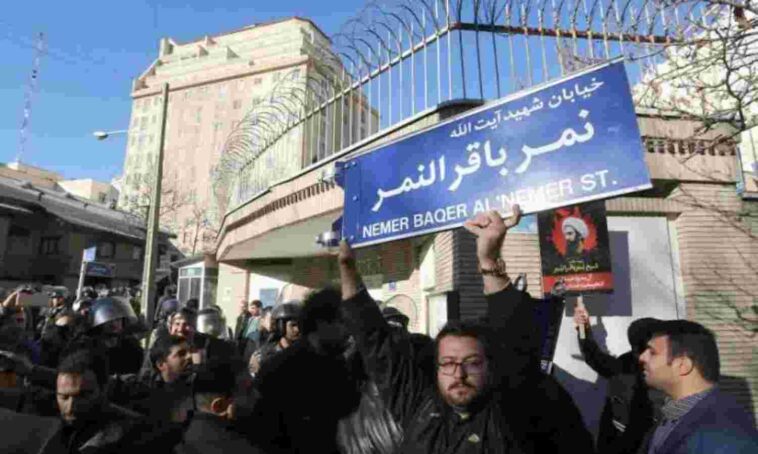The joint statement calls for the reestablishment of diplomatic relations and the restoration of embassies “within two months at the most.”
After seven years of tensions between the Mideast rivals, Iran and Saudi Arabia agreed on Friday to restore diplomatic relations and reopen embassies. The significant diplomatic breakthrough reached with China reduces the likelihood of armed conflict between the nations, both directly and through proxy conflicts in the region.

The agreement, reached this week in Beijing during the National People’s Congress, represents a significant diplomatic victory for China, as Gulf Arab states perceive the United States to be gradually withdrawing from the greater Middle East. Diplomats have also been attempting to end the years-long conflict in Yemen, in which both Iran and Saudi Arabia are profoundly entrenched.
The two countries issued a joint statement regarding the agreement brokered by China. The agreement was not promptly reported by Chinese state media.
Iranian state media published images and video of the meeting, which they claimed were captured in China. It depicted Ali Shamkhani, secretary of Iran’s Supreme National Security Council, with Saudi national security adviser Musa bin Mohammed al-Aiban and China’s most senior diplomat, Wang Yi.
“After the resolution is implemented, the foreign ministers of both countries will meet to prepare for an ambassadorial exchange,” Iranian state television reported. The statement added that the negotiations lasted four days.
ALSO READ: New India-Australia trade pact to be finalised this year: PM Albanese
The joint statement calls for the reestablishment of diplomatic relations and the restoration of embassies “within two months at the most.”
In the footage broadcast by Iranian media, Wang could be heard congratulating the two nations on their “wisdom.”
He stated, “Both factions have demonstrated sincerity.” “China endorses this agreement completely.”
China, which recently hosted the hard-line president of Iran, Ebrahim Raisi, is also one of the leading purchasers of Saudi crude. President Xi Jinping, who was just granted a third five-year tenure as president on Friday, travelled to Riyadh in December to attend meetings with oil-rich Gulf Arab nations vital to China’s energy supply.
Shamkhani was quoted by Iran’s state-run IRNA news agency as describing the discussions as “clear, transparent, comprehensive, and constructive.”
Shamkhani was quoted as saying, “Removing misunderstandings and adopting future-oriented perspectives in relations between Tehran and Riyadh will undoubtedly lead to an improvement in regional stability and security, as well as an increase in cooperation between nations of the Persian Gulf and the Islamic world in addressing current challenges.”
Shortly after the Iranian declaration, Saudi state media began to publish the identical statement.
High tensions exist between Iran and Saudi Arabia. In 2016, the monarchy severed ties with Iran after protesters stormed Saudi diplomatic posts there. A prominent Shiite cleric was executed by Saudi Arabia several days prior to the demonstrations.
The execution occurred during Crown Prince Mohammed bin Salman’s ascent to power, when he was a deputy. Prince Mohammed, the son of King Salman, once compared Iran’s Supreme Leader Ayatollah Ali Khamenei to Adolph Hitler and also threatened to strike Iran.
Since the United States unilaterally withdrew from the Iran nuclear agreement with world powers in 2018, tensions have risen dramatically throughout the Middle East. Since then, Iran has been blamed for a succession of attacks, including one in 2019 that temporarily halved Saudi Arabia’s crude oil output.
Although Yemeni Houthi rebels backed by Iran initially claimed responsibility for the assault, Western nations and experts have since placed the blame on Tehran. Iran has long denied initiating the assault. It has also denied involvement in subsequent attacks attributed to the Islamic Republic.
According to Kristian Ulrichsen, a research scholar at Rice University’s Baker Institute who has long studied the region, Saudi Arabia’s agreement with Iran followed the United Arab Emirates’ agreement with Tehran.
“This tension reduction and de-escalation has been ongoing for three years, and it was precipitated by the Saudis’ admission that without unconditional U.S. support, they were unable to project power against Iran and the rest of the region,” he said.
Ulrichsen added that Prince Mohammed, who is currently concentrated on massive construction projects in his own country, is also likely to seek an end to the Yemen war.
“Uncertainty could cause significant injury to his plans,” he said.
In September 2014, the Houthis captured Yemen’s capital, Sanaa, and drove the internationally recognised government into exile in Saudi Arabia. In March 2015, a Saudi-led coalition equipped with U.S. weapons and intelligence joined the conflict on the side of Yemen’s exiled government. Years of inconclusive fighting have created a humanitarian crisis and driven the poorest nation in the Arab world to the edge of famine.
The longest cease-fire of the war in Yemen, lasting six months, expired in October despite diplomatic efforts to extend it. This led to concerns that the conflict could escalate again. During the fighting in Yemen, over 150,000 people have been slain, including over 14,500 civilians.
In recent months, negotiations have taken place in Oman, a longstanding mediator between Iran and the United States. Some had hoped for an agreement before the observance of Ramadan, the holy Muslim month of fasting, which will commence later in March. In recent years, Iran and Saudi Arabia have held intermittent discussions, but it was unclear whether Yemen was the impetus for this new detente.
Recent seizures by the U.S. Navy and its allies include a number of shipments of weaponry from Iran destined for Yemen. Iran denies arming the Houthis, despite the fact that captured firearms match those seen in rebel hands on the battlefield. A United Nations arms embargo prohibits nations from supplying the Houthis with weaponry.
However, it remains unclear what this signifies for America. After its tumultuous withdrawal from Afghanistan in 2021, Washington’s intentions are no longer viewed as ensuring the energy security of the Middle East by regional leaders. The State Department of the United States did not immediately respond to a request for comment on the announced agreement.




